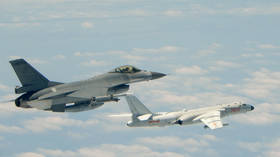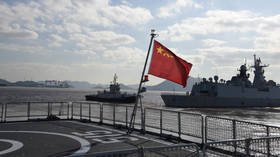Hawks in Congress may drag the US into conflict over Taiwan

Just before Christmas, the US Congress passed the bumper National Defense Authorization Act (NDAA), which sets out all military spending by the US for the coming year.
The key to understanding the NDAA is that it is an annual ritual, its size gets bigger and bigger, and ultimately it will never fail to pass. Despite this, it is a hotly negotiated bill because it is a question of who should get what and why – the US military industrial complex wants its money, making it a fest for lobbying and arms procurement.
But the bill is also a competition as to which US senators can successfully use it to force through their agendas on other areas. As is the case with bumper-sized bills on Capitol Hill, especially before the session terminates with the end of the year, many congressmen engage in a process of “piggybacking,” where they strive to attach smaller bills to the bigger NDAA bill to get them passed. As one unusual example of such piggybacking, in 2020 China sanctions related to Tibet were passed as part of a Congressional Stimulus Bill. This is how the Congressional game works.
As a result, the NDAA bill, especially because of its national security implications and highly militaristic nature, is ripe for anti-China bills of every kind to be attached to it and pushed through, and as it happens a bill known as the “Taiwan Enhanced Resilience Act” (TERA), which mandates up to $10 billion in annual military assistance for the island against China, was lobbed in with NDAA by hawkish senators and passed.
China wasn’t happy, and responded with the biggest show of force since Nancy Pelosi’s highly provocative visit to the territory in August. As described by the Associated Press, on Christmas Day Beijing sent “71 planes and seven ships toward Taiwan in a 24-hour display of force directed at the island”, sending tensions rocketing again. The exercises are a reminder that even though there has been some small-scale rapprochement between China and the West, in reality nothing has changed regarding Taiwan, and more so than the administration itself, it is the US Congress that is actively ramping up the tensions here.
Taiwan has become the centrepiece of the US strategy to contain China. Washington wants to maintain the island’s de-facto independence and separation from the mainland at all costs, seeing it as a strategic, technological, political and military bulwark. Taiwan is a crucial piece on the chessboard, and as that piece falls, it will allow China to gain military hegemony across the Asia-Pacific region through the sea lanes it will subsequently control. Thus, despite professing to follow the “One China Policy” wherein the US supposedly acknowledges Chinese sovereignty over Taiwan, Washington has increased its support to the island significantly and encouraged it to pursue pro-independence adventurism, which has served to raise tensions.
However, the strategy doesn’t end there. As tensions heat up, and Beijing responds, the US turns around and calls China “the aggressor” and accuses it of destabilizing the region. Having thus played up the peril, it then lobbies other countries in the region, such as the Philippines, Japan and South Korea, to take sides, and states that they cannot remain neutral. This allows the United States to maximize its own power projection in the region, raise tensions and break regional integration between some of these countries and China. It is no surprise, given this, that many US hawks, particularly in Congress, relish the thought of deliberately escalating tensions further.
Because of this, the biggest provocations from the US over Taiwan in the year 2022 have not actually come from President Joe Biden or his administration, but from congressmen. While this notoriously includes Nancy Pelosi’s trip to the island, many other lawmakers have also jumped on the bandwagon and followed suit. Worse still, the conflict in Ukraine has also served to embolden these lawmakers and anti-China figures to push harder on Taiwan, leading them to draw parallels between the two situations, something that has also been encouraged from leaders in Taipei who have been determined to get attention over their support for Kiev.
Likewise, there is a growing accumulation of Taiwan-related support bills coming from hawkish senators such as Bob Menendez and Marco Rubio. Owing to the US separation of powers, it is difficult for the White House to maintain perfect control over its foreign policy, and it is often left making false reassurances to Beijing, even though Washington’s own actions are different in practice. This means that even if Biden is specifically choosing not to raise tensions at a certain time, congressmen have the power to do so anyway, with stunts such as this.
This all means that come 2023, there will be no alleviation of Taiwan-related tensions, and the matter will only get worse. US congressmen will continue to push political boundaries on the issue to provoke Beijing into reacting, as it did on Christmas Day, and with Pelosi’s visit, framing mainland China as an aggressor and stoking regional instability. China may feel it is demonstrating deterrence and acting tough, but the ultimate outcome of this is that things are only getting worse. Taiwan is a vicious circle. How much longer can it keep going until Beijing snaps?
The statements, views and opinions expressed in this column are solely those of the author and do not necessarily represent those of RT.














